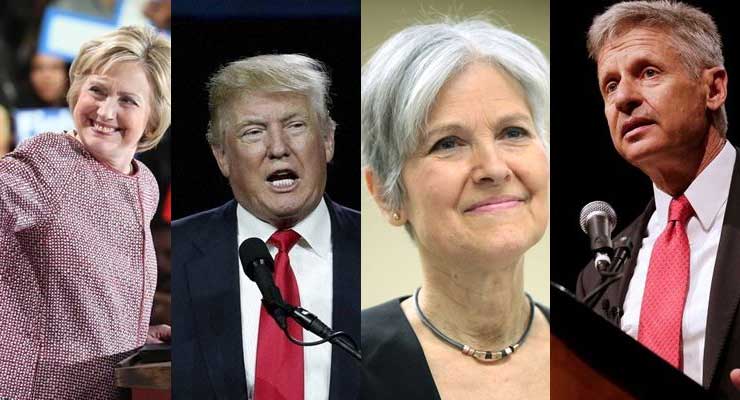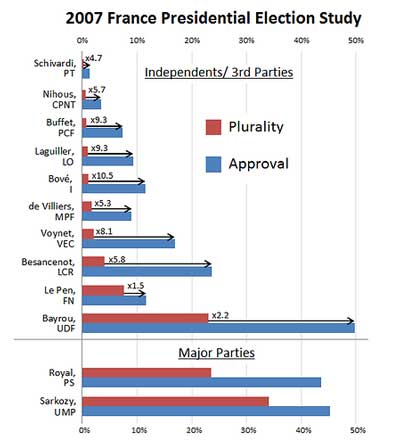
We’re crowdfunding this election year to do the best political polling you’ve ever seen in the United States. Really. Help us make it happen by pledging now (link is external).
The whole idea behind polling is to understand the support behind each candidate and predict how an election will turn out. That prediction part is why polling uses the same voting method (choose-one plurality) as our actual elections use.
Strangely, while polling matches the voting method, it doesn’t always match the candidates. Some polls exclude ballot-qualified candidates by listing them as “other”. (Though this does seem to be getting better this election cycle.)
And that has an effect. Pollsters that exclude third parties remove those candidates’ opportunity to get covered by the media. That’s media third parties can’t afford to buy on their own. When third party candidates are included by name, they’re commonly omitted from the pollsters’ headline paragraph (link is external) in press releases. Third parties need that coverage, too. The media so seldomly cover third parties that most voters don’t even know who these candidates are(link is external).
Acknowledging third parties is one way to make a presidential poll more meaningful. Another way is to include better voting methods, which helps understand how much support each candidate actually has.
If you’re new to our work, you may not realize that there are all kinds of different voting methods. A voting method is the rule that says how you express your vote and how your vote is calculated. Choosing one candidate and adding up those single-choice votes (plurality voting) is just one way to go about this.
That plurality voting approach is also considered among experts (link is external) to be the worst voting method there is. The list of reasons is long. It gives artificially low support to third parties and independents, which makes it nearly impossible for them to make headway against major parties. It causes spoilers even when a challenger candidate gets few votes. The vote can split in the middle as well, causing moderate candidates to get squeezed out in crowded primaries or competitive general elections. Fears of a wasted vote and vote splitting have many candidates choose not to even run. And those missing candidates deprive voters of alternative policy perspectives.
Aside from our awful plurality voting method, you’ll be helping us study alternatives. These include approval voting where voters choose as many candidates as they want. Score voting allows voters to rate all the candidates on a scale. Borda translates rankings to points. Condorcet has rankings simulate head-to-head elections. And instant runoff voting has rankings simulate plurality voting with sequential runoffs.
 Never before have all these methods been included in one poll, though there has been international research comparing methods like plurality voting and approval voting (See figure for French study). Having all the methods in one poll instead provides a direct comparison for each method.
Never before have all these methods been included in one poll, though there has been international research comparing methods like plurality voting and approval voting (See figure for French study). Having all the methods in one poll instead provides a direct comparison for each method.
Additionally, we’ll be able to test several hypotheses:
- Would the voting method affect turnout?
- Would people vote more honestly with different voting methods?
- Would the voting method benefit third-party support?
- Would the outcome change by adding a new candidate?
- Would the voting method affect the election’s outcome?
As a bonus question, we’ll be asking voters who they would like to see in the debates, a more relevant question for admission than asking who voters would choose using a terrible voting method.
Also, if we don’t do this project, it won’t happen. Congress has long-since removed funding for political science research that doesn’t impact economic interests or national security. Though arguably, voting methods affect both. Voting methods certainly affect our well being through policy decisions. In response to this limitation, The National Science Foundation removed its grant funding(link is external) as well.
Aside from others not doing this project, we know voting methods better than anyone. Plus, we’re collaborating with The Associated Press-NORC Center for Public Affairs Research(link is external) at the University of Chicago. They’ve been doing polling for 75 years, and we’re confident they’re a good fit with us. Contracting out the polling also helps us keep independence with the data.
This will be the first time Americans will have the opportunity to see how meaningful alternative voting methods can be. And it will be within the context of an election they can relate to. Right now, most people in the US simply have no idea. The voting method is the most underappreciated electoral reform there is.
This is an exciting project. But we need you to help make it happen. Our funding support needs to move quickly right after our launch planned for the start of September. And so we’re taking pledges. Right now, please go ahead and add your pledge below. Know someone else who is upset about our political system? Share this pledge page with them as well. The timing for this project couldn’t be more appropriate.
Leave a Reply